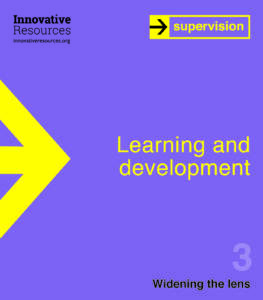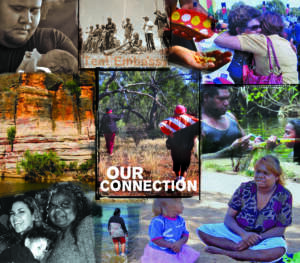
Reimagining Supervision through connection, creativity and care
Posted: 27/11/2025Supervision is an important part of any human services role—whether it be as the supervisor or supervisee—but not every experience is positive. Clinical Supervisor, Jess Marsh, has developed a way to make supervision a safe, creative and unique experience for everyone involved.
When Jess Marsh first stepped into a leadership role, she did what many do—she figured it out as she went. Like countless professionals thrust into supervisory positions, she hadn’t experienced good supervision herself, let alone clinical supervision.
‘I remember thinking, what am I even meant to be doing?’ she recalls. ‘I struggled a lot with imposter syndrome and just hoped I was doing a good job.’
That early uncertainty planted the seeds for what would become a transformative journey—one that led Jess to develop a new approach to supervision, grounded in psychological safety, creativity, and deep listening. Today, she’s a counsellor, clinical supervisor, and the creator of the Supervision Menu, a flexible framework that’s helping practitioners across the sector rethink how they support each other.
Jess’s pathway to supervision
Jess’s turning point came during her time at the Australian Childhood Foundation, where she worked for four years.
‘I had brilliant supervision and a mentor who helped me discover who I am as a supervisor,’ she says.
That experience gave her the confidence to experiment with new ways of engaging her team. She noticed that how supervision began—whether with deep breaths, calming music, or a body scan—could set the tone for the entire session.
‘I had this moment of … there’s something here,’ she says. ‘It made me think, what if I had options people could choose from?’
That question led to the first version of the Supervision Menu—a rough draft, by her own admission, but one that laid the foundation for a more intentional, person-centred approach.
‘I wanted to connect with people based on what was happening for them that day,’ she explains. ‘Not just rely on talk-based strategies.’
The Supervision Menu: A framework for flexibility
The Supervision Menu is structured like a meal—entrée, main course, dessert—with each section offering different ways to engage, reflect, and finish well. It’s designed to be fluid, adaptable, and responsive to the needs of both the supervisor and supervisee.
‘What works for one person doesn’t work for another,’ Jess says. ‘So, I always start with a supervision agreement. What’s worked for you before? What hasn’t? What kind of communication do you prefer?’
At the heart of the menu is the idea of psychological safety—creating a space where people feel held, heard, and empowered. Jess is clear: supervision should never be a space people dread.
‘Too often, supervision is used to tell people what they’re not doing,’ she says. ‘It becomes a task list, not a space to unpack what’s really going on.’
Instead, Jess sees supervision as a relational, creative act.
‘If the people I’m supporting feel safe and held, that translates into their practice,’ she says. ‘And their clients receive the best possible support.’
Cards on the table: Innovative Resources in practice
Jess’s approach is deeply informed by her love of Innovative Resources card sets.
‘I’m a bit of a fangirl,’ she laughs.
Over the years, she’s collected sets like The Bears, Body Signals, Strength Cards, and Picture This, using them to bring expressive and somatic strategies into supervision.
‘These cards help people make meaning of what’s happening for them,’ she explains. ‘Not just a debrief and a dump, but actually processing the work.’
 In one group supervision session with a youth mentoring service, Jess used The Bears cards to help participants reflect on each other’s emotional states.
In one group supervision session with a youth mentoring service, Jess used The Bears cards to help participants reflect on each other’s emotional states.
‘They were able to say, “I’ve noticed you’ve looked upset this week,” and have that conversation,’ she says. ‘It built connection and transparency.’
She also uses the cards digitally, integrating them into online sessions via Microsoft Whiteboard.
‘People can circle options, choose a card that represents their week, and we can explore that narrative together,’ she says.
Supervision as a creative act
Jess is passionate about making supervision a space for creativity and authenticity.
‘As adults, we sometimes shy away from creative approaches,’ she says. ‘There’s this idea that good supervision is just sitting in a room and talking. But so many people aren’t actually processing the work.’
The menu offers options, not prescriptions.
‘It doesn’t have to work for everybody,’ she says, ‘but it gives people the chance to try something different.’
That includes tailoring the menu to cultural contexts. Jess is deeply committed to working respectfully with Aboriginal and Torres Strait Islander peoples, adapting her approach based on the lands and traditions of her supervisees.
‘It might mean doing supervision out on Country,’ she says. ‘Or connecting in a different way.’
The menu includes a blank section for people to add their own ‘course’—whether they’re working in schools, allied health, LGBTQIA+ contexts, or community settings.
‘It’s about meeting the person in front of you,’ Jess says. ‘Culture has many layers, and we need to celebrate and integrate that into the work.’
Wellbeing as the final course
For Jess, supervision isn’t just about professional development—it’s about wellbeing.
‘Dessert is an important part of the menu,’ she says. ‘How do we finish well? Do you need a break? How do you orientate back into your workspace?’
She’s seen firsthand how burnout affects frontline workers, especially nurses and teachers.
‘I’d love to see the stats on whether adequate supervision could reduce burnout and vicarious trauma,’ she says, ‘because in my private practice, a lot of my counselling clients are nurses and teachers.’
Jess believes everyone deserves good supervision.
‘It’s about being authentic,’ she says. ‘Not just booking a random time between meetings. How do we keep this person well?’
BeWith: A philosophy of presence
Jess’s private practice is called BeWith, a name that reflects her philosophy of being alongside people on their journey.
‘Supervisees know they have you holding them through it,’ she says. ‘They don’t have to figure it out alone.’
 She often quotes Lisa Dion: “You are the best tool in the workshop.” For Jess, the relationship and rapport between supervisor and supervisee are the most important resources.
She often quotes Lisa Dion: “You are the best tool in the workshop.” For Jess, the relationship and rapport between supervisor and supervisee are the most important resources.
‘Yes, the cards and the menu can complement the work,’ she says, ‘but you are the key resource.’
The Supervision Menu is more than a tool—it’s an invitation to rethink how we show up for each other. It’s a reminder that supervision can be spacious, creative, and deeply human. And it’s a testament to Jess Marsh’s belief that when we feel safe, we can do our best work.
By John Holton
Featured products:



Leave a Reply